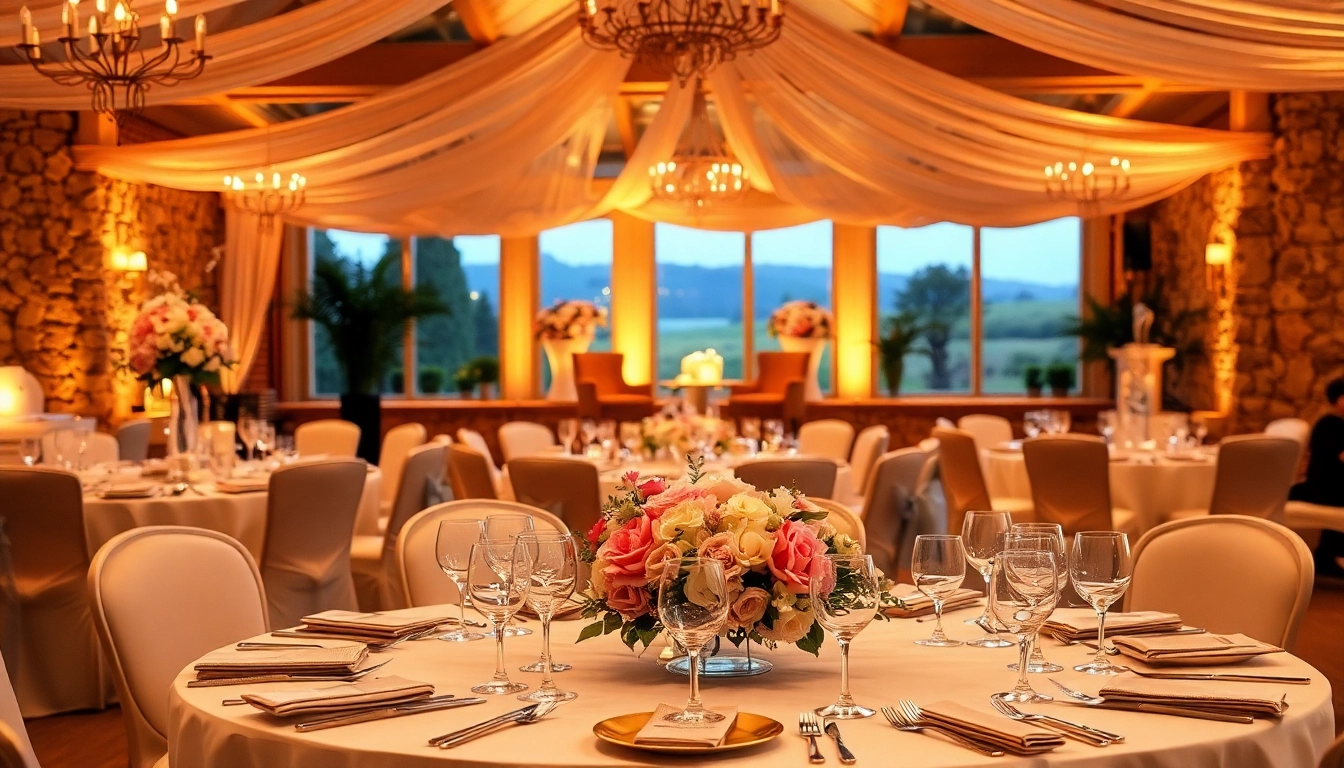Understanding Your Event Space Needs
Choosing the right event space can be a daunting task, with numerous factors to consider to ensure your event is successful. Whether you’re planning a corporate seminar, a wedding, or a community gathering, the space you select plays a crucial role in setting the tone and facilitating a memorable experience. To streamline your selection process, it’s vital to first assess your specific needs.
Defining the Purpose of Your Event Space
The first step in selecting an event space is to clearly define the purpose of your gathering. This determination will guide every subsequent decision, from the type of venue to the amenities required. For instance, is your event designed to educate, celebrate, or entertain? Understanding the primary goal will allow you to match the venue’s attributes with your vision.
Consider the nature of your event:
- Corporate Events: Meetings or training sessions typically require a professional atmosphere, necessary technology, and space to collaborate.
- Social Events: Weddings and parties may prioritize aesthetics, ambiance, and comfort to ensure guests enjoy a memorable time.
- Community Events: Fairs or festivals might need expansive outdoor spaces, accessibility, and facilities to accommodate larger crowds.
By pinpointing the main objective, you can create a checklist that incorporates the essential elements required for your event space.
Assessing Guest Capacity for Your Event Space
Understanding guest capacity is paramount when selecting an event space. Be realistic about the number of attendees expected and ensure the venue can comfortably accommodate them. Consider the following factors:
- Seating Arrangements: Determine how seating will be configured—classroom, theater-style, or round tables—and what that means for space planning.
- Social Distancing: In the current climate, ensuring adequate space for comfort and safety is essential, meaning you may need a larger venue than usual.
- Breakout Areas: For events that require smaller group discussions, look for venues that offer multiple rooms or spaces.
It’s advisable to discuss these needs with venue managers who can provide insights into capacity limits and the flexibility of the space.
Exploring Amenities and Features of Event Space
No two event spaces are alike, and each comes with its unique blend of amenities and features. Before making a decision, consider which amenities are non-negotiable for your event’s success:
- Audio-Visual Equipment: Ensure the venue has the necessary technology, including projectors, screens, and sound systems.
- Wi-Fi Access: A reliable internet connection is often a must-have for business engagements and may also benefit social events.
- Catering Options: Check if the venue offers catering services or has partnerships with local caterers for convenience.
- Parking and Accessibility: Convenient parking facilities and accessible entrances are crucial for guest satisfaction.
Taking the time to identify essential amenities can significantly enhance the functionality and overall success of your chosen event space.
Types of Event Spaces Available
Event spaces come in various shapes and forms, each suited to different types of gatherings. Understanding the different types can help you select the best venue for your needs.
Indoor vs Outdoor Event Space: Pros and Cons
The choice between indoor and outdoor venues is fundamental and can profoundly affect the atmosphere and logistics of your event. Each option comes with its advantages and disadvantages:
Indoor Event Space
Indoor venues are often climate-controlled, providing a consistent environment regardless of the weather. With a plethora of choices, including hotels, convention centers, and historic buildings, the indoor setting can cater to various themes and styles.
Pros:
- Controlled environment.
- Availability of necessary facilities like restrooms and catering.
- Ability to theme and decorate extensively.
Cons:
- Potentially more expensive due to higher demand.
- Limited natural ambiance compared to outdoor spaces.
Outdoor Event Space
Choosing an outdoor venue can provide a unique aesthetic filled with natural beauty, perfect for weddings, festivals, or casual gatherings. However, reliability on weather conditions is a significant factor.
Pros:
- Beautiful natural surroundings enhance ambiance.
- Spaciousness for larger gatherings.
- Generally, a more relaxed atmosphere.
Cons:
- Weather-dependent, which can lead to disruptions.
- May lack facilities like restrooms or kitchens.
Unique Venues for Memorable Event Space Experiences
For organizations or individuals looking to make a statement, unique venues can offer a distinct edge. From art galleries and museums to warehouses and beaches, creative venues enhance your event’s memorability. Consider the following unique options:
- Art Galleries: Provide a cultured atmosphere paired with stunning backdrops.
- Historic Buildings: Offer charm and character, contributing to a more rich narrative.
- Non-Traditional Spaces: Factories or lofts can create a raw, unique setting, perfect for specific themes.
These unconventional spaces can transform an ordinary event into an extraordinary one, fostering an immersive experience that attendees won’t forget.
Corporate Event Space vs Social Event Space
Catering to different event types may also dictate your venue needs. Corporate events often require different amenities compared to social gatherings. Identify your event type to align your event space selection accordingly:
Corporate Event Spaces
These spaces tend to be equipped with necessary technologies and amenities required for presentations, meetings, and networking.
Social Event Spaces
Social venues focus more on aesthetic and comfort, providing an environment conducive to relaxation and enjoyment.
Your objectives will dictate not only the function of your event space but also the atmosphere you want to promote.
Location Considerations for Your Event Space
The location of your event space plays a critical role in its accessibility and overall success. Analyze how the venue’s location affects guest attendance and the overall experience.
Accessibility and Transport Options for Event Space
Analyzing convenience is essential. An accessible venue invites higher attendance and a better experience for your guests. Look for venues that offer:
- Parking Facilities: Ample parking nearby reduces stress for guests traveling by car.
- Public Transport Links: Proximity to buses, trains, or trams provides options for guests and promotes inclusivity.
- Accessibility for All: Ensure the venue accommodates individuals with disabilities.
These aspects contribute to overall logistics, ensuring a seamless experience from arrival to departure.
Neighborhood Vibe: Enhancing Your Event Space Experience
The surrounding neighborhood can greatly affect the energy of your event. Familiarize yourself with the area’s vibe:
- Local Attractions: Check what’s nearby that could enhance the guest experience, such as restaurants or entertainment options.
- Cultural Elements: Choosing a venue in a vibrant area can elevate the atmosphere and provide unique opportunities for activities.
- Safety and Amenities: Research the general safety of the area and availability of essential amenities like hotels and transport.
A venue that is both appealing and practical in its location can dramatically enhance your event’s success.
Nearby Accommodations for Guests of Your Event Space
For multi-day events or gatherings that attract out-of-town guests, nearby accommodations are crucial. Ensure there are sufficient hotel and lodging options that cater to different budgets:
- Variety of Options: Choose a venue with hotels ranging from moderately priced to upscale.
- Group Discounts: Many hotels offer group rates for event bookings, which can be leveraged for savings.
- Transportation Services: Hotels that provide shuttle services to your venue enhance convenience for attendees.
The convenience afforded by suitable accommodations can positively influence your guests’ overall experience.
Budgeting for Your Event Space
Setting a budget is a foundational aspect of planning any event. When budgeting for an event space, consider the overall cost implications and any potential hidden fees.
Event Space Rental Costs Explained
Understanding rental costs is critical. Costs will vary significantly based on location, venue type, and specific timeframes. Breakdown possible costs as follows:
- Rental Fees: The base cost of using the space, usually quoted per hour or for the day.
- Deposit Requirements: Many venues require a percentage upfront to secure the booking.
- Inclusions: Determine what’s included in the rental agreement, such as furniture, AV equipment, and cleaning services.
Aligning your budget with the required amenities ensures you don’t overlook essential costs that could impact your event significantly.
Hidden Fees to Look Out for in Event Space Contracts
Many venues often have additional fees that may not be highlighted in the initial quotes. Stay attentive to the following:
- Setup and Breakdown Costs: Some venues charge for setup and teardown, so clarify these details ahead of time.
- Service Charges: These fees can add a significant amount to the overall cost, usually ranging from 15-20% of your total.
- Insurance Fees: Liability insurance might be required, and we recommend budgeting for this.
Addressing these hidden costs ensures your budget aligns realistically with your expectations.
Maximizing Value from Your Chosen Event Space
To ensure you get the most out of your selected event space, consider strategies to maximize value:
- Negotiate: Don’t shy away from negotiation; venues often have flexibility in pricing.
- Flexible Dates: Booking during off-peak times can lead to significant discounts.
- Bundle Services: Opt for packages that include catering, decorations, and other services for better value.
Taking a proactive approach to budgeting and negotiation empowers you to make the most of your investment, ensuring a successful event.
Booking and Finalizing Your Event Space
Once you’ve selected your ideal event space, the next step is to book the venue and finalize all necessary arrangements. Taking time to review contract details can mitigate future risks.
How to Secure Your Event Space Reservation
Secure your booking by following these steps:
- Visit the Venue: Always conduct an in-person visit to ensure it aligns with your expectations and needs.
- Finalize Contract Details: Understand all clauses, including cancellation policies and payment schedules.
- Confirm with a Deposit: Ensure to provide deposit payments as required to lock in your event date.
Regular communication with the venue coordinator maintains clarity and ensures all arrangements align with your planning timelines.
Understanding Terms and Conditions of Event Space
Being diligent about understanding venue terms is vital. Review and clarify:
- Cancellation Policies: Know what your options are should plans change.
- Force Majeure Clauses: Understand the venue’s policies in case of unforeseen natural disasters or emergencies.
- Liability Agreements: Understand your responsibilities regarding any damages to property.
Understanding these elements safeguards against undue surprises as the event date approaches.
Preparing for Your Event: Checklist for Event Space
Preparation is key to a successful event. Establish a comprehensive checklist that includes:
- Timeline: Create a detailed timeline of tasks leading up to the event.
- Equipment: Make a list of all equipment needed and who is responsible for setting it up.
- Communication: Confirm all arrangements with vendors and stakeholders.
Maintaining a checklist can alleviate stress and ensure that no critical detail is overlooked.
In conclusion, choosing an event space is a multifaceted process that requires careful consideration and planning. By understanding your needs, exploring various venue types, and adhering to a structured approach in budgeting and booking, you can ensure a successful event that resonates with guests and fulfills your objectives.














Leave a Reply